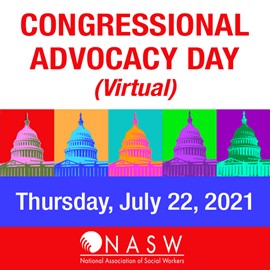NASW Virtual Congressional Advocacy Day
By Lee Westgate, MSW, MBA, LCSW-CNASW Manager of Policy and Advocacy
Social work is sometimes divided into two seemingly disparate worlds: policy and practice. In truth, these are not separate domains. Sound social policy is informed by the voices, the front-line stories, and insights from practitioners. Advocacy is the means by which we tell the compelling stories about our clients and communities to policymakers, and it is the means by which we elevate our profession and the enduring and impactful contributions that social workers make every day.
 On July 22 NASW conducted a Virtual Congressional Advocacy Day to advance congressional legislation that will have a direct, positive impact on practice and social justice.
On July 22 NASW conducted a Virtual Congressional Advocacy Day to advance congressional legislation that will have a direct, positive impact on practice and social justice.
The 154 NASW participants in attendance were instrumental in advocating on behalf of four key policy areas which are part of NASW’s larger 2021 Blueprint of Federal Social Policy Priorities:
- The Improving Access to Mental Health Act (S. 870/H.R. 2035)
- The Community-Based Response Act (S. 2046/H.R. 3862)
- The For the People Act (S. 1)
- Extending Telehealth Flexibilities beyond the Public Health Emergency (PHE)
Lawmakers heard first-hand from social workers about the urgent need to ensure that Medicare is providing critically important mental health services. The Improving Access to Mental Health Act will allow individuals receiving skilled care in nursing homes to have access to clinical social work services. It will also enable beneficiaries to receive clinical social work services when they have a medical or physical condition that gives rise to a psychosocial concern, such as anxiety or depression. Importantly, the bill increases the reimbursement rate for social workers providing this much needed care. This step is essential in ensuring that there is a sufficient workforce to meet the mental health needs of the nation’s growing number of older adults, as well as people with disabilities.
The Community-Based Response Act (S. 2046/H.R. 3862) which in turn recognizes the expertise that social workers can bring to responding to community-based mental health crises as a viable alternative to law enforcement activation. Participants emphasized that this act is connected with a larger body of work on racial justice. The uprisings anchored to racial justice this past year alone have crystallized how important it is to reimagine the ways in which we organize the delivery of mental health to include building and implementing evidence-based alternatives to 911-related escalations of care that far too often result in the imposition of harm rather than the provision of help.
Participants also advocated for the permanent extension of telehealth flexibilities beyond the COVID-19 public health emergency (PHE). Attendees shared their own lessons learned from COVID-19 and how telehealth—especially the ability to use audio-only devices—enabled access to care to a broad array of clients. Participants highlighted the need for payment parity across all modes of clinical care (i.e. face to face, audio-visual, and audio-only). Clinicians present shared their own stories of how countless individuals were able to receive care for the first time because of the flexibilities that exist due to the PHE. They also expressed their concern about barriers to care such as a Medicare requirement introduced in late 2020 that there be an in-person visit before initiating tele-behavioral health services.
Lastly, participants implored Senators to support the For the People Act. The bill was not debated due to a filibuster in June. This legislation, already passed by the House, is essential in ensuring equitable access to the ballot box and encountering the wave of voter suppression efforts at the state level – efforts that limit voting access for communities of color in particular.
This event would not be possible without the participation of NASW members – all of whom gave generously of their time and their expertise to paint a compelling picture of what our essential work looks like. While the Virtual Congressional Advocacy Day was a success, our work in these spaces is ongoing. Each of us stand ready to play a pivotal role in these advocacy efforts. In order to continue to advance these efforts, there are some immediate actions that each of us can take to engage our congressional delegation and to uplift these policy priorities.
Next Steps: Call to Action. We ask that social workers contact their lawmakers in Congress.
To build momentum from #SWAdvocacyDay, we ask that social workers email and call their lawmakers and ask them to cosponsor priority legislation. Here is a link to talking points. You can quickly email your lawmakers using NASW’s action alerts.
We need at least 175 cosponsors in the House and over 50 in the Senate to demonstrate broad support for our priority legislation and to elevate the bills for potential consideration before the Congressional committees of jurisdiction. If we do not secure enough cosponsors in this Congress, the bills will likely not advance through the legislative process and therefore, will need to be reintroduced in future Congresses. Our continued collective advocacy is crucial and will make a difference.




